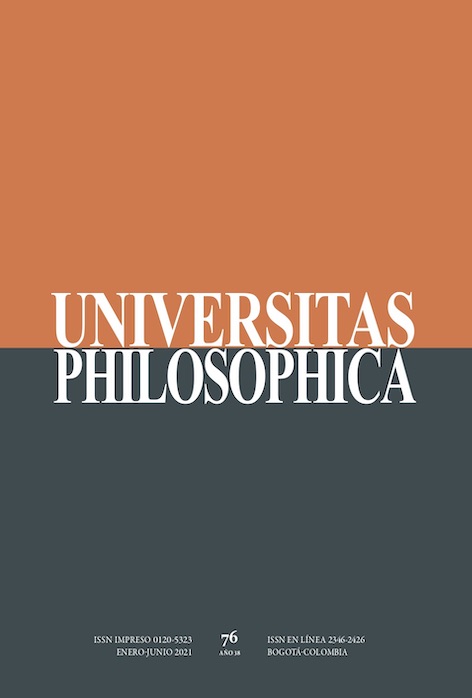Resumen
Este artículo aporta a la teoría deleuziana de la Idea mediante un comentario a su definición técnica: “una multiplicidad definida y continua de n-dimensiones”, presentada por Deleuze en el capítulo IV de Diferencia y repetición (1968). Esta definición entrelaza implícitamente la propia metafísica deleuziana de la Idea como problema virtual con una serie de nociones de la geometría diferencial desarrollada por el matemático alemán Georg B. Riemann. Con el fin de iluminar esta influencia, en un primer momento reconstruiremos los elementos fundamentales de las nociones riemannianas retomadas por Deleuze para, en un segundo momento, mostrar cómo estos elementos están supuestos por la noción deleuziana de Idea.
Althusser, L., Balibar, É., Macherey, P., & Rancière, J. (1965). Lire le capital. París: Maspero.
Babini, J. (1977). Newton, Leibniz y el cálculo infinitesimal. En: J. Babini (Ed.), El cálculo infinitesimal (pp. 15-39). Buenos Aires: Eudeba.
Boi, L. (1995). Le problème mathématique de l’espace. Une quête de l’intelligible. Berlín: Springer.
Calamari, M. (2015). Riemann-Weyl in Deleuze’s Bergsonism and the Constitution of the Contemporary Physico-Mathematical Space. Deleuze Studies, 9(1), 59-87. https://doi.org/10.3366/dls.2015.0174
Datri, E. (1999). Geometría y realidad física de Euclides a Riemann. Buenos Aires: Eudeba.
Deleuze, G. (1987a). El bergsonismo. (Trad. L. F. Carracedo). Madrid: Cátedra.Deleuze, G. (2002). Diferencia y repetición. (Trad. H. Beccacece y M. S.
Delpy). Buenos Aires: Amorrortu.
Deleuze, G. (1987b). Foucault. (Trad. J. V. Pérez). Barcelona: Paidós.
Deleuze, G. (1996). Conversaciones. (Trad. J. L. Pardo). Valencia: Pre-Textos.
Deleuze, G. (2013). Lógica del sentido. (Trad. M. Morey). Barcelona: Paidós.
Deleuze, G. (2005). La isla desierta y otros textos. Textos y entrevistas (1953-1974). (Trad. J. L. Pardo). Valencia : Pre-Textos.
Deleuze, G., & Guattari, F. (1985). El Anti-Edipo. Capitalismo y esquizofrenia. (Vol. 1). (Trad. F. Monge). Barcelona: Paidós.
Deleuze, G. & Guattari, F. (1988). Mil mesetas. Capitalismo y esquizofrenia. (Vol. 2).
(Trad. J. V. Pérez y U. Larraceleta). Valencia: Pre-textos.
Deleuze, G. & Guattari, F. (1993). ¿Qué es la filosofía? (Trad. T. Kauf). Barcelona: Anagrama.Deleuze, G., (2019). Lo actual y lo virtual. (Trad. R. Di Renzo). Buenos Aires: Red Editorial.
Díez Montoya, S. (2020). La ontología de los problemas de Diferencia y repetición. Universitas Philosophica, 37(74), 77-100. https://doi.org/10.11144/Javeriana.uph37-74.opdr.
Duffy, S. (2013). Deleuze and the History of Mathematics. In Defense of the New. Edimburgo: Edinburgh University Press.
Jedrzejewzki, F. (2017). Deleuze et la géométrie riemanniene: Une topologie des multiplicités. En: L. Ji, A. Papadopoulos & S. Yamada (Eds.), From Riemann to Differential Geometry and Relativity (pp. 311-328). Cham: Springer International Publishing.
Kline, M. (1992). El pensamiento matemático de la antigüedad a nuestros días. (Trad. M. Martínez, J. Tarrés & A. Casal). Madrid: Alianza Editorial.
Lautman, A. (2011). Ensayos sobre la dialéctica, estructura y unidad de las matemáticas modernas (Trad. F. Zalamea). Bogotá: Universidad Nacional de Colombia.
McNamara, R. (2018). Filosofía del espacio y teoría de la acción en Gilles Deleuze. Contrastes. Revista Internacional de Filosofía, XXIII(2), 41-57. https://doi.org/10.24310/Contrastescontrastes.v23i2.5571
Plotnitsky, A. (2006). Manifolds: On the Concept of Space in Riemann and Deleuze. En: S. Duffy (Ed.), Virtual Mathematics. The Logic of Difference
(pp. 187-208). London: Clinamen Press.
Plotnitsky, A. (2009). Riemann’s Conceptual Mathematics. Configurations, 17(1-2), 105-130.
Poincaré, H. (1902). Science et hypothèse. París: Flammarion.
Riemann, G. B. (1898). Sur les hypothèses qui servent de fondement à la géométrie (Trad. J. Houel). Œuvres mathématiques (pp. 280-299). París: Gauthier-Vilars.
Santaya, G. (2015). La Idea según Gilles Deleuze: Una aproximación desde el cálculo diferencial. Ideas. Revista de filosofía moderna y contemporánea, 1, 134-162.
Santaya, G. (2017). El cálculo trascendental. Gilles Deleuze y el cálculo diferencial: ontología e historia. (Colección “Deleuze y las fuentes de su filosofía.” Vol. IV).
Buenos Aires: RAGIF Ediciones.
Scholz, E. (1992). Riemann’s Vision of a New Approach to Geometry. En: L. Boi, D. Flament & J. M. Salanskis (Eds.), 1830-1930: A Century of Geometry. Epistemology, History and Mathematics (pp. 22-34). Berlín: Springer-Verlag.
Torretti, R. (1998). El paraíso de Cantor. La tradición conjuntista en la filosofía matemática. Santiago de Chile: Editorial Universitaria y Universidad Andrés Bello.
Vuillemin, J. (1962). La philosophie de l’algèbre. París: PUF.
Weyl, H. (1922). Temps, espace, matière. Leçons sur la théorie de la relativité générale. (Trad. G. Juvet y R. Leroy). París: Albert Blanchard.
Widder, N. (2019). The Mathematics of Continuous Multiplicities: The Role of Riemann in Deleuze’s Reading of Bergson. Deleuze & Guattari Studies, 13(3), 331-354. https://doi.org/10.3366/dlgs.2019.0361.
Zalamea, F. (2020). Diferencia y repetición: Preludios en la matemática moderna y ecos en la matemática contemporánea. Universitas Philosophica, 37(74), 139-153. https://doi.org/10.11144/Javeriana.uph37-74.drpm

Esta obra está bajo una licencia internacional Creative Commons Atribución 4.0.
Derechos de autor 2021 Gonzalo Santaya


